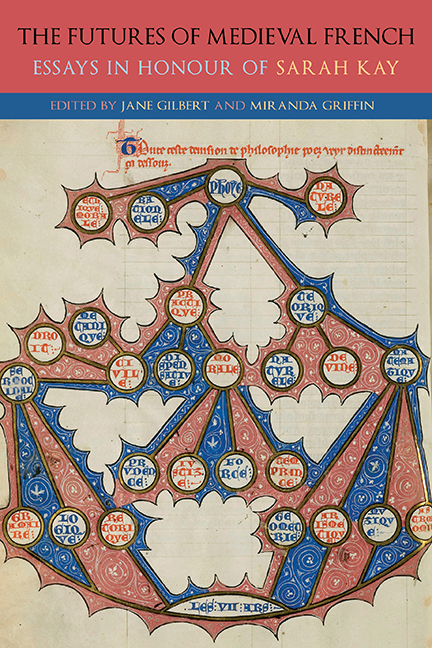Book contents
- Frontmatter
- Dedication
- Contents
- List of Illustrations
- List of Contributors
- List of Abbreviations
- Introduction
- Part I Subjectivity in Troubadour Poetry
- Part II The ‘Chansons de geste’ in the Age of Romance: Political Fictions
- Part III Courtly Contradictions: The Emergence of the Literary Object in the Twelfth Century
- Part IV The Place of Thought: The Complexity of One in French Didactic Literature
- Part V Parrots and Nightingales: Troubadour Quotations and the Development of European Poetry
- Part VI Animal Skins and the Reading Self in Medieval Latin and French Bestiaries
- Afterword
- General Bibliography
- List of Manuscripts
- Bibliography of Work by Sarah Kay
- Index
- Gallica
Quoting Lyrics and Subjectivities in the Chastelaine de Vergy
Published online by Cambridge University Press: 27 May 2021
- Frontmatter
- Dedication
- Contents
- List of Illustrations
- List of Contributors
- List of Abbreviations
- Introduction
- Part I Subjectivity in Troubadour Poetry
- Part II The ‘Chansons de geste’ in the Age of Romance: Political Fictions
- Part III Courtly Contradictions: The Emergence of the Literary Object in the Twelfth Century
- Part IV The Place of Thought: The Complexity of One in French Didactic Literature
- Part V Parrots and Nightingales: Troubadour Quotations and the Development of European Poetry
- Part VI Animal Skins and the Reading Self in Medieval Latin and French Bestiaries
- Afterword
- General Bibliography
- List of Manuscripts
- Bibliography of Work by Sarah Kay
- Index
- Gallica
Summary
THIS ESSAY EXAMINES the insertion of lines from a lyric by the Châtelain de Coucy (a twelfth-century trouvère) into the Chastelaine de Vergy, a short courtly narrative poem composed in the thirteenth century. I use Sarah Kay's distinction to argue that although, by seemingly quoting the Châtelain de Coucy's lines verbatim, the author of the Chastelaine could appear to be a ‘parrot’, he (or possibly she – although I shall use masculine pronouns throughout this essay to refer to the narrative authorial voice) in fact becomes a ‘nightingale’ in creating an altogether new context for the words he so parrots, thereby introducing further irony and complexity into a deceptively simple text. This essay first analyses the formal insertion of the quoted lyric lines in the narrative text and its variation across manuscripts, paying particular attention to the ways in which the eight decasyllabic lyric lines are integrated into the octosyllabic narrative poem. I then explore the linguistic interplay between the quoted lyric lines and the various discourses represented in the narrative – that of the narrator and those of the characters – and their role in the construction of (inter-)subjectivity in the text. If the speaking subject of the quoted text is, as Parrots and Nightingales shows, intrinsically ambiguous in the case of inserted lyric, in the Chastelaine the quoting subject is also obscured because the lyric stanza quoted in direct discourse is embedded within what could be deemed to be a passage in free indirect discourse, or at the very least a situation of internal focalisation. It is therefore difficult to ascertain who is responsible for the quotation: the narrator or his main male character. This ambiguity is deeply significant in a text that Laurence De Looze describes as a ‘drama of language’ (1985: 45). Indeed, reported discourse is far from being unproblematic in the text since it is rarely used to express laudable feelings or straightforward information, but mostly appears in dialogues that reveal secrets, betray oaths, and deliberately cause harm. The rest of this essay further takes into account the relevance of the content, context, and discursive frame of the original lyric, as well as the lyric persona of the Châtelain de Coucy in the building – or obscuring – of knowledge, authority, and meaning in the narrative poem.
- Type
- Chapter
- Information
- The Futures of Medieval FrenchEssays in Honour of Sarah Kay, pp. 233 - 249Publisher: Boydell & BrewerPrint publication year: 2021



